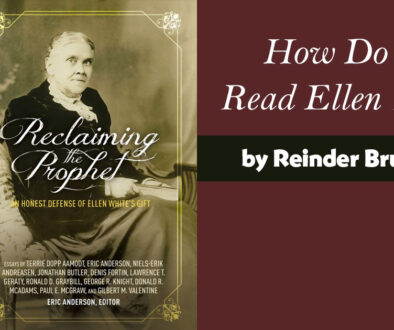Doors or Windows?
by Shelley Curtis Weaver | 28 May 2024 |
In 2012, the controversial and often-compromised British comedian, Russell Brand, invited leaders of the Westboro Baptist Church to a conversation. For those unfamiliar, the Westboro Baptist Church is known for (or notorious for) using high-profile memorial services for veterans as a platform to denounce homosexuality. They assemble at churches and cemeteries, shouting and holding signs with abusive language claiming God hates homosexuality and homosexuals.
The stated goal of Brand’s conversation was to understand why a group claiming to be Christian employed offensive language and harassed grieving families, just to get media attention for their messages of hate.
Interestingly, the Westboro Baptist representatives pushed back at Brand’s description of their actions as “hate speech.”
“You love your neighbor as yourself when you warn them that their sin is taking them to hell. . . . So from a Bible standard we love you all. I know you all can’t believe that from your goofy Hallmark standard [of love], but from a Bible standard we love you.”
I isolate this quote because it’s about the only point they make in the interview that’s not too abusive or too ridiculous to repeat, and therein also lies the danger and the appeal of this rationale: it sounds nice.
“Care and concern” camouflage
It sounds nice to describe ourselves or our actions as motivated by caring and concern. It sounds nice to claim the person under attack is standing on the brink of eternal loss, and needs our rebuke to steer them from destruction.
It sounds so nice, in fact, that our own Adventist leadership employs similar language in efforts to scrutinize and approve who can officially belong to our community.
Prefacing the comments that we must “hate the sin but love the sinner” is always the caveat that we must treat LGBTQIA+ persons “. . . with respect, with love, with care.” This nice-sounding caution implies that the restrictions are for everyone’s protection. Apparently those crossing the church steps are entering a zone pre-packaged for heaven, and harboring anyone not qualified will imperil them and us. We are duty-bound to shut the doors on some, keeping our membership sifted and same.
So what’s the point of exclusion?
I’m not trying to be cynical here. I’m honestly asking: what damage would it do if someone imperfect or uncommitted to all of the 28 Fundamental Beliefs was part of our membership? How would they harm themselves or others by being “on the books” and worshiping with us? Because we know—the whole LGBTQIA+ question aside—that’s exactly what the entirety of our membership is: imperfect people who are not always committed to the exact 28 Fundamental Beliefs.
The problem may be with our understanding of what a church is, and what membership means. Some protest that a group must have rules to define what belonging means, or else belonging is pointless. But church is not a country club where belonging is nice but not meaningful. We usually claim that church has a purpose.
Adventists in particular underscore the point that Jesus attended the synagogue on Sabbath, “as was his custom”—a claim that prioritizes both the sabbath and participation in formal religious services. We typically believe that church is meant to be a source of fellowship and growth, and a place to meet with God.
So it’s critical for our church to have clarity on this point. Are we windows helping people see God more clearly, or are we doors, shutting out the sacred from the profane?
The company Jesus keeps
It’s an old struggle within Christendom, and one that first played out on someone’s doorstep. When Jesus calls Matthew Levi, he is deliberately including a “backslidden” son of Abraham, enmeshed in the financial workings and social circles of the Roman Empire.
The problem is that when Matthew celebrates his calling, he invites his old friends along. The party at Matthew’s house is filled with folks who don’t belong to God’s people: tax-collectors, prostitutes, and other sinners galore. And there is Jesus, hanging out with them all.
We can almost imagine the religious leaders standing on Matthew’s doorstep aghast, asking why Jesus is in this household, associating with this company. It sounds like a good question, a holy question.
The problem with asking it—with picking and choosing who has access to Jesus—is that they excluded themselves from needing Jesus. They prided themselves on their religious health and vigor, and when Jesus said the sick need a physician, they didn’t think they belonged.
The house that day was full of belonging, filled to the brim with the kind of “goofy Hallmark definition of love” the Westboro Baptists and religious leaders of Jesus’s time found distressing. The gatekeepers on the doorsteps of faith are always concerned things will get goofy and no one will rebuke the offenders. But Jesus wasn’t shy about truth-telling. One of his most direct rebukes involved leaders who focus on rules instead of relief.
“Then Jesus said to the crowds and to his disciples: ‘The teachers of the law and the Pharisees sit in Moses’ seat. So you must be careful to do everything they tell you. But do not do what they do, for they do not practice what they preach. They tie up heavy, cumbersome loads and put them on other people’s shoulders, but they themselves are not willing to lift a finger to move them’” (Matthew 23:1-4, NIV).
And he had more direct words about teachers making legalists out of those trying to enter the kingdom of grace.
. . . “The greatest among you will be your servant. For those who exalt themselves will be humbled, and those who humble themselves will be exalted. “Woe to you, teachers of the law and Pharisees, you hypocrites! You shut the door of the kingdom of heaven in people’s faces. You yourselves do not enter, nor will you let those enter who are trying to. . . . You travel over land and sea to win a single convert, and when you have succeeded, you make them twice as much a child of hell as you are. . . . You give a tenth of your spices—mint, dill and cumin. But you have neglected the more important matters of the law—justice, mercy and faithfulness. You should have practiced the latter, without neglecting the former” (Matthew 23:8-24).
When the “more important matters of the law—justice, mercy, and faithfulness” are regarded as just so much goofy Hallmark love-mongering, we entangle people in the soulless distraction of sorting and tithing kitchen spices. We make endless rules and waste time at our world-church family reunions editing our fundamental beliefs. We might better be celebrating that Jesus stands at every door knocking, longing to be let in. Who are we to block entrance?
We have bigger fish to fry
The words of Jesus himself should be the pinnacle of biblical clarity on this matter. He has much to say about the real problems in the church. He speaks about rivalry and ambition—about the risks of self-promotion and wanting the best seats at the table. He says that to really learn requires openness—eyes and ears willing to see and hear. He sets high expectations—new treasures will be discovered along with the old gems of truth we hold dear. Jesus warns about prayers of self-congratulation, and the risk of “looking good” outside, but having fatal dysfunctions within.
Those listening called them “hard teachings.”
Yet among the challenging teachings of Jesus, some of our favorite exclusions are absent. It seems hard for us to admit that Jesus says not one word about homosexuality, though it was certainly visible in the Hellenistic culture of his time.
Jesus does speak of celibacy: he describes it as innate at birth (God-given) or chosen by an individual, but not as a spiritual requirement. He does not command it as the solution to any issue of sexual identity.
We aren’t in charge of the guest list
Most significantly, Jesus denies all of us the authority to decide who has access to him, who is good enough to enter his presence or belong to him. In his various parables, we are stripped of that role. He says we are farm workers, too zealous and unwise to sort the wheat from the weeds, too prone to dislodge and discard those who belong in our haste. We are never to tolerate abuse, but deciding who is inherently good and bad is not our call.
We are rushing to fill church with worthy guests, and are then bewildered when many find excuses to stay away. Meanwhile, Jesus is inviting those who feel their need for fellowship at God’s wide table. Jesus calls from the streets, the vacant lots, the shelters and tent-camps those who are truly hungry and aware of their need.
There is a risk of deciding we belong and others do not. We may be in peril right now, as we tighten down our identity as Seventh-day Adventists. We seem to believe our status as the remnant church opens doors and seats us at the table automatically. We are selling this concept with the kindest of words, and by sharing our concern that anyone outside the perimeters studied and approved by our special committees will be lost.
We’ve seen this play out in a recent enforcement of our membership rules. Mid-America Union and Rocky Mountain Conference leaders pressured the church in Boulder, Colorado, to reject the voted and approved membership transfer of a married gay man. To avoid causing trouble for the Boulder church, the applicant exited instead. Jesus, the one who stands at doors and knocks, the one who longs to sit down at humanity’s table and share living bread, says there’s a risk in refusing to sit beside the others God has invited,
”. . . many will come from the east and the west, and will take their places at the feast with Abraham, Isaac and Jacob in the kingdom of heaven. But the subjects of the kingdom will be thrown outside. . .” (Matthew 8:10-12, NIV).
Better to be windows allowing a view of God’s mercy, than doors closing entrance to the kingdom.
 Shelley Curtis Weaver lives in coastal Washington state. She is a clay-artist, writer, wife, mother, grandmother, and a frequenter of Columbia River crossings. She has edited and contributed to The Journey to Wholeness addiction recovery curriculum from AdventSource.
Shelley Curtis Weaver lives in coastal Washington state. She is a clay-artist, writer, wife, mother, grandmother, and a frequenter of Columbia River crossings. She has edited and contributed to The Journey to Wholeness addiction recovery curriculum from AdventSource.
To comment, click/tap here.




